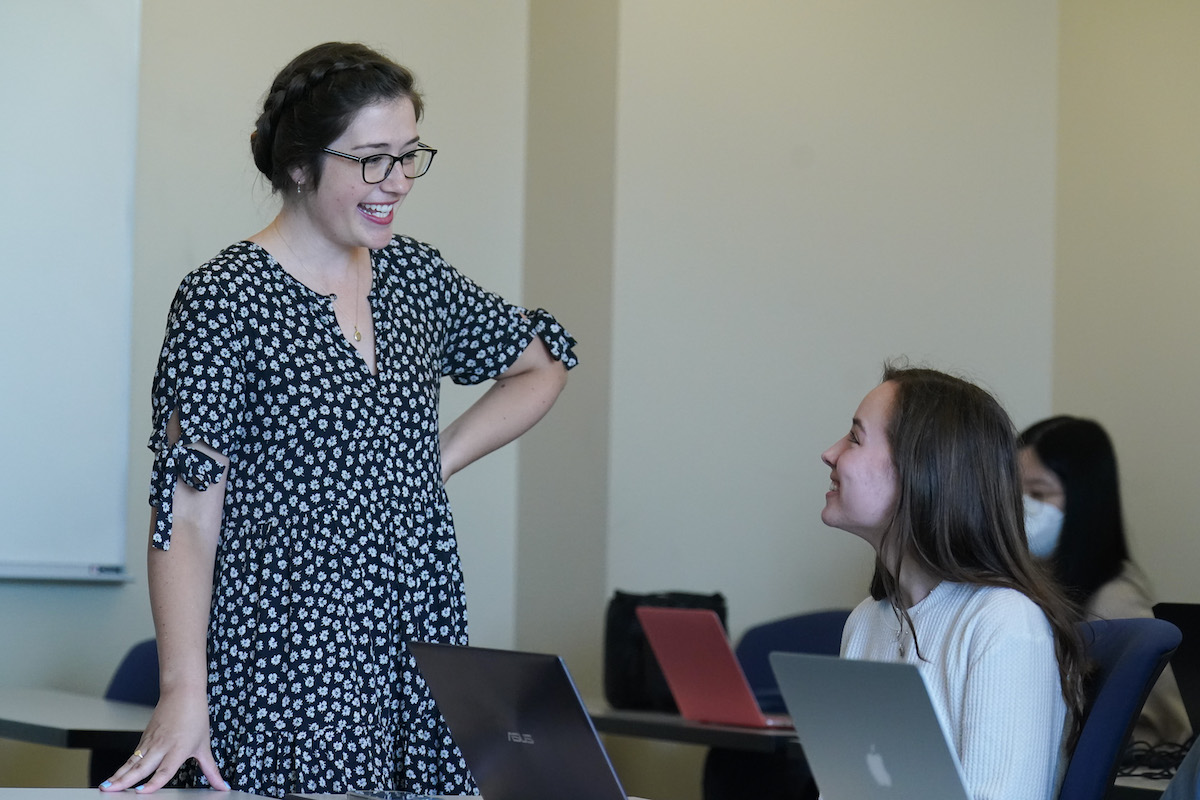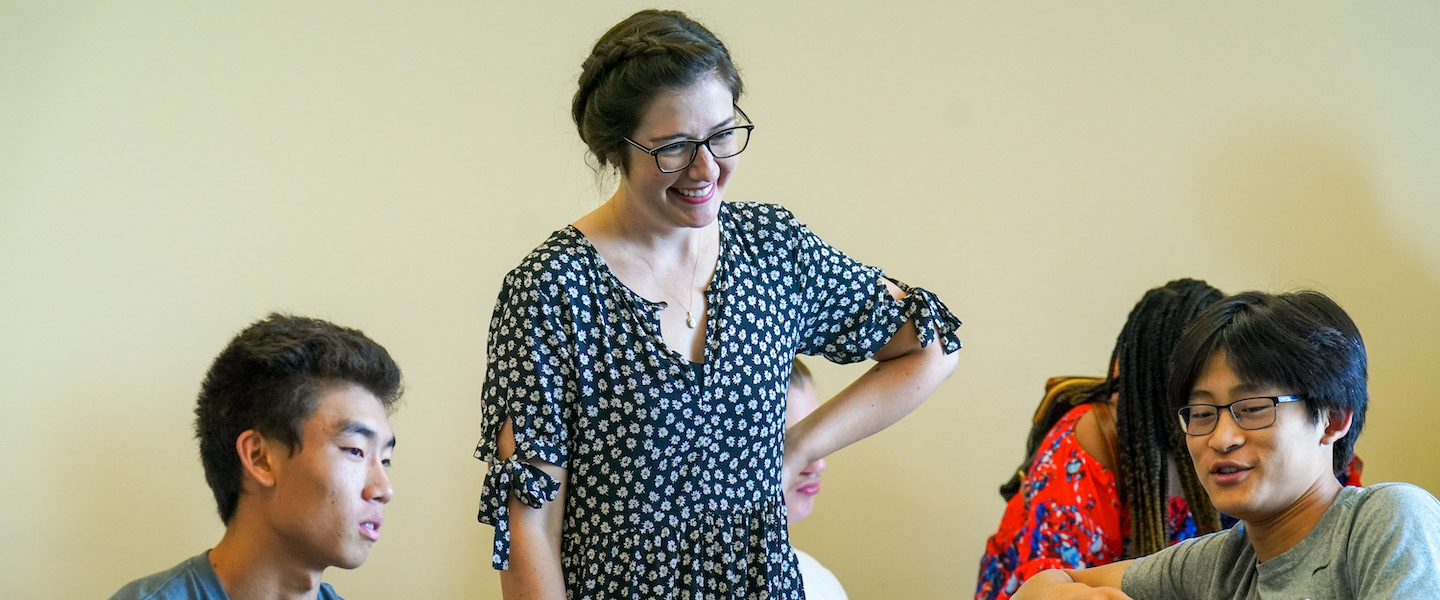Dr. Christina Davis, assistant professor of data science, brings a unique blend of scientific rigor and creative problem-solving to her role as the director of Belmont’s data science program. With a background in astrophysics and a passion for teaching, she helps students with an engaging and custom journey into the field, allowing them to use the tools available to solve niche problems they are interested in solving.
 Why Data Science?
Why Data Science?
Davis has always loved science and scientific thinking. “I like solving little mysteries or trying to figure out systematic approaches to solve ‘mushy’ problems,” she explained.
For those with similar interests, data science is what Davis would describe as “a hodgepodge” between statistics and computer science, allowing for algorithmic thinking to solve problems that are not easy to define.
“Once you get the coding aspect, it starts to turn into something that feels like Legos to my brain,” Davis added. “You can constantly build up the complexity and find new ways to look at something that you haven’t thought of before.”
However, data science is as focused on the application and communication elements as it is on the problem solving.
“You might be the communicator between scientists and the audience,” Davis clarified. “We are striking that balance between something technical and something that can reach people.”
Why Belmont?
Not many universities have a full degree in data science, which makes Belmont unique. But what really sets Belmont's data science program apart is its flexibility.
While providing a solid technical foundation in statistics and coding, the program allows students to tailor their learning experience through diverse elective offerings and the addition of a minor.
“You get a ton of flexibility, whether you want to specialize on the backend with the computer or you want to work on visualizations and take classes with the business systems analytics team,” Davis explained. “It’s exciting to be in a program that has a lot of opportunity for growth because we get to riff off the interests of our students.”
For example, many students expressed interest in learning about data mining, so that class was newly created this semester out of student interest. Led by Dr. Rudy Bedeley, the course looks into scraping pieces of information from the internet to build datasets.
Additionally, Davis teaches a scientific computing class, which she describes as problem solving through “four mini hackathons all in one” where students solve completely different kinds of problems. One might focus on ecology while another focuses on health care, allowing students to gain team building, problem solving and creative ways to approach a variety of issues.
Davis noted that students like real world problems. They like to understand the nuances and where the decisions are being made. “Not just cookie cutter textbook, right answers only, obvious-type problems. They like to see, ‘Oh, wow, well, if I did this, then I could maybe solve this kind of problem. Or if I did this, I could extend this further in a different direction,” she said. “Allowing for that creativity is something that I try and do a lot in the higher classes, and it's been a lot of fun.”
She concluded, “It’s really exciting to hear that our program suits the needs of and fulfills a purpose that a lot of students are looking for right now."
What will I learn?
At the heart of Belmont's data science program lie essential learning outcomes: statistical proficiency and coding mastery (particularly in Python). Beyond those things, Belmont’s program heavily focuses on the communication elements.
Students are equipped with the skills to not only analyze data but also convey insights in a compelling narrative—a vital component often overlooked in traditional STEM fields.
“We want you to be able to communicate, not necessarily what some numerical summaries are, but how certain we are on those summaries,” Davis explained. “We want you to be able to present with confidence from a scientific way what the results are.”
Students practice building a story with data at several levels and finish with a portfolio class, approaching the job market with a portfolio of all the diverse projects they completed throughout their academic career.
This focus falls in line with Belmont’s priority on storytelling. “At Belmont, students are getting that framing not just from the technical, zoomed in numbers and ‘hard math’ perspective, but they're also understanding the application, the extension into the community and the people who are going to be affected by this,” Davis emphasized. “Trying to support that whole-person investigation is a big thing that we try to do in our program so that students can make a clear and concise argument they believe to be ethically sound with their data.”
What can I do with a degree in Data Science?
There are a plethora of career paths for data science graduates, spanning graduate school, health care, tech giants like Facebook and Google, and even niche sectors like neuroscience.
“We see people kind of go everywhere,” Davis encouraged. “It's more and more common that companies, no matter what they sell, have a data department of some kind – whether that's in marketing, problem tracking or even personality management.”
With the exponential growth of data-driven industries, the demand for skilled data scientists continues to soar, presenting abundant opportunities for Belmont's graduates, particularly in Nashville’s job market with large health care and business sectors.
More about Dr. Davis
 Hailing from Baton Rouge, Louisiana, Davis began her academic journey at Louisiana State University where she studied mathematics and physics. Her fascination with scientific inquiry led her to pursue a Ph.D. in astrophysics at Vanderbilt University, focusing on computer simulations and statistical analysis of different types of galaxies. She then joined Belmont as an adjunct professor in the physics department before transitioning to her current role as the director of the data science program.
Hailing from Baton Rouge, Louisiana, Davis began her academic journey at Louisiana State University where she studied mathematics and physics. Her fascination with scientific inquiry led her to pursue a Ph.D. in astrophysics at Vanderbilt University, focusing on computer simulations and statistical analysis of different types of galaxies. She then joined Belmont as an adjunct professor in the physics department before transitioning to her current role as the director of the data science program.
“Coming to Belmont, even as an adjunct, I was instantly hooked,” Davis said. “The faculty were so warm and wonderful, and the students were just really special.”
Outside the classroom, her personal interests gravitate toward the opposite of math and screens —be it mountain biking, crafting or cooking.
But inside the classroom, Davis feels energized. “I love teaching. I love connecting with people. I love solving random little problems,” she explained. “The creativity that I'm allowed here at Belmont, combined with the students and the student engagement, is something that I don't think I could have dreamt up if I tried. I'm absolutely thrilled to be in the position I'm in and be able to have such awesome students.”
Davis aims to foster a collaborative and dynamic learning environment in her classes, adapting her teaching approach to suit the needs of her students.
“It's fun to have a mix of students from different majors and different minors in my intro class and kind of get a feel for their various interests. Then I can pull examples from that,” Davis explained. “This year, my class has a lot of sports fans, so we're kind of leaning into analytics of sports. In the past, we've had more people who are interested in justice systems and ethics, and so we leaned that way. I let the class direct the mood and the theme in some direction, and I think that's speaks to a lot of people.”
In essence, Davis epitomizes the spirit of innovation and intellectual curiosity that defines Belmont's Data Science Program. With her guidance, students embark on a transformative journey, honing their analytical prowess and embracing the boundless possibilities of data science.

